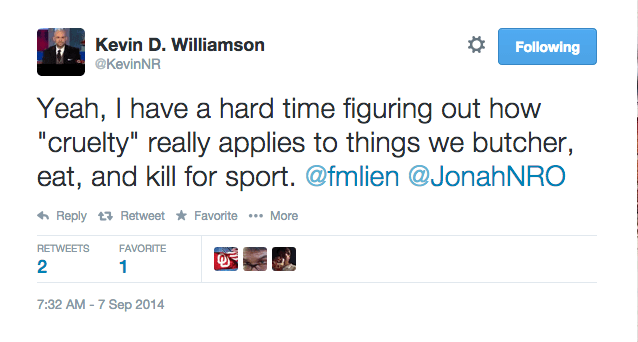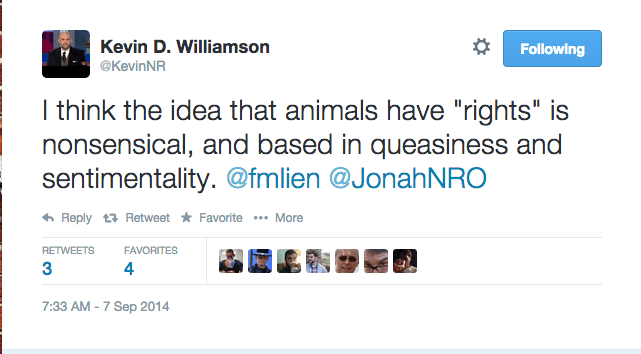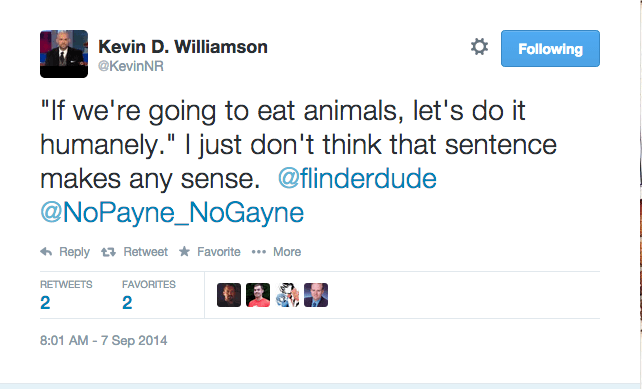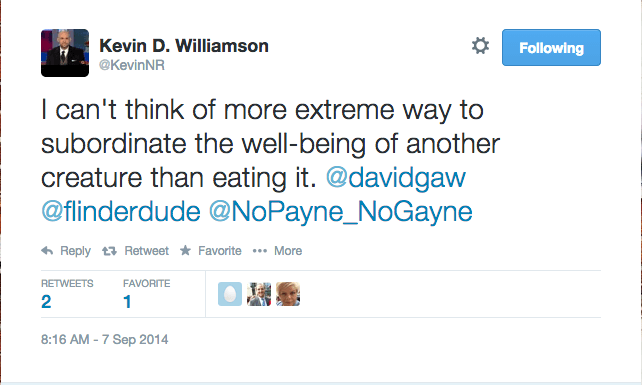Ricochet is the best place on the internet to discuss the issues of the day, either through commenting on posts or writing your own for our active and dynamic community in a fully moderated environment. In addition, the Ricochet Audio Network offers over 50 original podcasts with new episodes released every day.
 How Do You Think about Animal Rights?
How Do You Think about Animal Rights?
Browsing Twitter yesterday — what, like you spent the whole weekend building low-income housing and going to the gym? — I stumbled across an interesting exchange being curated by NR’s Kevin Williamson on the topic of animal rights. His take: that the whole idea of animal cruelty is awash in confusion.

A few other offerings:



I recall, around the time I was an undergraduate — that point in your life when you think you need a single, conclusory sentence on hand to resolve each and every philosophical question — trying to work my way through the animal rights issue. I never could. You can try to make the arguments in a vacuum of pure logic, but for me — and I think for many of us — it’s ultimately a judgment largely influenced by what Williamson rightly calls “sentimentality” (which, I would argue, is not always and everywhere a vice). There’s nothing about the existence of a chicken, a pig, or a cow that makes me intrinsically recoil at the idea of slaughtering it for food. Would I want to do the killing (the question the animal rights crowd will often pose to you)? No. But there are a lot of endeavors vital to society that I wouldn’t want to execute myself. That’s not sufficient to establish them as morally suspect. Viva comparative advantage!
By the same token, there are plenty of animals — dogs, cats, horses, etc. — that tend to inspire an elevated sense of attachment in us. Maybe it’s something intrinsic to them. Maybe it’s actually just a reflection of us — something about those species that makes humans more likely to think of them as possessed of discrete personalities and worthy of greater respect than lower beasts (can you imagine forming the same kind of bond with a pet spider as with your Labrador?). Regardless, I think it’s generally folly to dismiss such widely-held, naturally-occurring sentiments just because they can’t be justified with pure logic.
I sort of understand where Williamson is coming from on the question of cruelty. I myself have entertained a similar thought in the past — if taking a life is the most violative act we can perform, how can we simultaneously be okay with killing animals yet outraged at lesser offenses against them?
On closer inspection, however, it’s a matter of stewardship, isn’t it? Most of us non-vegetarians don’t think twice about someone slaughtering pigs, cows, or chickens for food. But I’m willing to bet that almost all of us would be uncomfortable with the idea of someone gratuitously making one of those animals suffer. Would it be philosophically inconsistent to be okay with someone killing a deer for sport but to blanch at the idea of a hunter taking a non-fatal shot just for the sadistic pleasure of watching the crippled animal limp away? Because I think the vast majority of us would make a clear distinction there, even without introducing the (philosophically messy) concept of “animal rights.”
The higher the regard that we have for the species, the less accommodating we are. You may think that cockfighting is abhorrent, but, if you’re even slightly sympathetic on the matter, it probably doesn’t effect you as viscerally as Michael Vick’s dogfighting (the topic that began Williamson’s Twitter exchange). Is it consistent? Probably not. But does that mean it’s wrong?
As is probably clear, I’ve never been able to work out a concise articulation of the controlling principle here. And I’m not sure I want to. Go too far in one direction and you’re living in an impractical universe where we all ought to be vegans (I guess it’s okay to eat living things as long as they don’t have mouths?). Overcorrect the other way and you’re in a place where all animals are nothing more than instruments of human desire, with all considerations of mercy superfluous. I’m not sure exactly how you to get my world — where spiders and snakes get what’s coming to them and everything else is on a sliding scale.
Help me out, Ricochet. How would you articulate the proper principles by which we ought to think about the treatment of animals?
Published in General




Almost all of us are going to agree with this. I can’t speak for Kevin, but the impression I get is that he is using the term “rights” correctly, where as those he debates are using them in the modern parlance of “Stuff I like”.
Well said, Troy.
Why do we war? Because some things are more valuable than life itself. Why are we willing to kill our human aggressors, but not to permit idle torture of them? Because even killing them is a sad and ugly business, and only stopping them is necessary.
But, yes, that line of reasoning stumped me once before… much to my chagrin, as it cost me the favor of a pretty liberal in college. Of course, that’s a good thing, but it was a real bummer at the time.
I used to own cats. One time, I was moving a bunch of wood from my parents front yard to their wood pile in the back. As I got to the bottom of the pile, I discovered that a mole had set up shop in a gap in the bottom of the wood.
Not wanting to crush it with an errant log, I grabbed the mole (wearing gloves, of course) with the intent of releasing it away from the house, but when I released it, the foolish creature ran directly towards my Mom’s barn cat. Like, you couldn’t have thrown the thing and had it land any closer to Figaro. Fig, of course is on his side and sunning himself, only to have this mole run directly into his deadly claws – the easiest lunch ever.
To watch that cat savage a still living rodent (cruelly releasing and then recatching it, seemingly for fun) and then watching him subsequently eat the defenseless infant moles in the wood pile reminded me of how truly savage nature is – even in microcosm with a common housecat.
Humans can tell the difference between the cruel savagery of nature and the killing of necessity.
“Would it be philosophically inconsistent to be okay with someone killing a deer for sport but to blanch at the idea of a hunter taking a non-fatal shot just for the sadistic pleasure of watching the crippled animal limp away?”
Would you agree that most people would feel disgust at the thought of a kid pulling the legs, one at a time, off a spider ?
The issue is not that the animal may or may not feel pain but that the human involved is being sadistic. It’s not about the animal but about the man. The man is behaving in a manner that is below his human nature. Anyone who has seen a cat “play” with a mouse it has captured knows what animalistic behavior looks like. When a man sinks to that level, he is reverting to a non-human behavior.
(Majestyk posts much faster than I do.)
Killing is ugly. Young men always and everywhere imagine themselves hunting and fighting because violence is an inescapable part of nature — our own and of the wider natural world. But it is unfortunate. Most people, if asked to imagine a perfect world, imagine a world without pain and death… though we still might hunt and battle without real harm, as children do in play.
It is an honorable aspiration to minimize harm, pain, and all things we would prefer did not exist. Is it sinful or immoral to aspire much lower than one is capable of realizing?
Of course, our relationships with various animals are more complicated than that. Most people intuitively recognize the Great Chain of Being, though we struggle to precisely outline it. Suppose that it was possible to “hook” a deer and “throw it back” to the woods, as in sport fishing. Would we stab and release deer with the same impunity as we do with fish?
Boy, do you know how to bait the hook for Kenneth, or what? We will now learn if Kenneth lurketh under (yet) another Ricochet pseudonym.
Only moderns have trouble with this issue. Ancient peoples understood that a rock, while part of God’s creation, is not a tree, and a tree is something less than a bee, and a bee is something less than a horse, and a horse is something way less than a person.
Animals do not have rights. People have obligations (to ourselves and to creation) not to mistreat them. Ethical treatment of animals is as old as the Bible. The day of rest was for the oxen, too.
Do most people equate the two? I once read that army studies in the early 20th Century found that very few soldiers were afraid of death, but were instead afraid of pain, and that’s why they tried to supply WWII medics with plenty of morphine. It wasn’t for the benefit of saving wounded soldiers’ lives. Instead, it was because soldiers were less likely to desert and more likely to fight when they were relatively assured of a less painful death.
Plus you weren’t to muzzle the oxen while it was treading out the grain (iow, let it eat while it works),
Kevin has the order wrong. One kills, then butchers, then eats. To my knowledge only the first and last things are done for sport.
“By the same token, there are plenty of animals — dogs, cats, horses, etc. — that tend to inspire an elevated sense of attachment in us. … I’m not sure exactly how you to get my world — where spiders and snakes get what’s coming to them and everything else is on a sliding scale.”
And yet many people keep spiders, snakes, rodents, even bugs as pets. Many a farm kid has had a cow or a pig as a pet.
I have a rancher friend that has some cattle. She has named them all and treats them as pets. (She used to run over a hundred, but she’s a widow and over 70 and can’t handle as many now.) Some of the names: Sirloin, Prime Bib and Burger. She expects to see all of them in her freezer in the future.
This is animal husbandry at its best.
AMIC Apprentice Butcher Competition at the LambEx conference in Wayville Showgrounds
http://iifp.sa.edu.au/2014/07/amic-apprentice-butcher-competition-lambex-conference-wayville-showgrounds/
I concur. The obligations vary, too, though. As a hunter, pursuing excellence in the hunt, it is unprofessional to botch killing the animal, and having botched the shot, I owe the animal a quick death. A rancher owes the same to the cattle, without the excuse that the hunter is hitting a moving target.
Story goes my grandmother once failed to behead a chicken in one stroke, and the thing got away -running around the kitchen like, well, you know. Having botched it once, ever after she wrung the chickens’ necks because it was the only way to guarantee it was done right, which she had an obligation to do.
Out obligations to our working animals and social companions are accordingly higher still because their service to us is higher still -or at least of a different order. Be kind to you food animals, but don’t forget they aren’t your pets.
Oh, I’m sure people conflate the two all the time, though this distinction makes perfect sense to me. I consider being maimed in a car wreck far more terrifying than just being decapitated and getting it over with. I just hope when they put all us Conservatives against a wall they can find someone who can shoot worth a darn.
Is there no space for a strictly utilitarian argument? Many animals act morally towards one another, just as humans do. Why would animals (not in possession of cognition as we would understand it) do this? The answer of course is that there must be an evolved mechanism which is present in behavior that produces benefits to that animal or to its species. We have it too. It enables (most of) us to behave without the iron hand of law or police constantly bearing down upon us.
Humans, being in possession of sentience can also communicate with one another about our feelings directly and can give a name to that feeling we get when we see something we dislike happening to another person or animal: we call it empathy.
Because we are capable of imagining somebody doing a similar thing to us and how that would make us feel, it makes us deeply uncomfortable.
Humans are also the only animal to suffer from the anthropomorphic fallacy. Animal rights types take that to the extreme.
I am of that generation where we knew our food before we ate it. I grew up on a farm. We’d make a pet out of the steer my dad would coddle with extra grain for a few months, before he took it to the butcher in town to be turned into our winter beef supply. I fed and cared for the (stupid) chickens, and then assisted in plucking their feathers and cleaning out their innards so they, too, could join the beef in the freezer. Even the cute little piglets were destined for the frying pan, ultimately. Life on the farm!
In that world, if you were cruel to animals, or mistreated them, then they might die or be diseased, and that would result in not having adequate food for the humans. Or it could result in a loss of money when you did not have that animal to sell after devoting much time and effort to raising it.
Animals are not humans, however, animals deserve to be treated humanely. They are not superior to us, but we, as humans, are required to use our humanity to care for them. We are the stewards.
As a carnivore, I would mention that I spend extra to buy free range because although animal protein is important to the diet, it doesn’t need to be a torturous procedure. I don’t eat milk-fed veal either.
Pet ownership is a very culturally-influenced topic. Muslims find Western fondness for dogs incomprehensible and Westerners find the sacredness of the cow in India to be somewhat puzzling. At least we can all agree that cats should be spoiled rotten and treated like the princes and princesses they believe themselves to be?
The strictly utilitarian argument is that the purpose of life is to reproduce and pass on one’s genes to the next generation. Not every individual organism must reproduce in order for this to occur. Instead, a critical number of each generation must reproduce in order for the best of that generation’s genes to get passed on. Therefore, animals have no individual rights but species could arguably have a right to continued existence. This is why, according to an old Native American story, one always spares the first turtle one comes across, in order to ensure there will always be more turtles.
I can “get” the idea of digging cows so much that you don’t eat em. It would mean they treat cows the way I treat cats. Groovy.
What’s puzzling is the extremes to which some go in their adoration and worship of cows. That’s what’s puzzling.
Not the fact that they have cow sanctuaries. That would be no different than the people over here who run cat sanctuaries.
No, the extremes to which I refer go … a bit … further …
If we look to the Word of God, there are some pretty clear principles:
1) In a perfect world (one without sin), there is no death and people do not eat animals.
2) We don’t live in a perfect world and in the one we inhabit, God has permitted killing animals to meet our needs — food, clothing, protection. We’re not supposed to like the killing; it is death and reminds us of sin. But animal life is subordinate to human life, and can be taken for our benefit.
3) Cruelty is forbidden. There is indeed a difference between killing humanely and doing so in a way that increases suffering. There is a moral imperative to preserve human life when realistically possible, even when there is suffering. There is no such imperative with animal life; most of us, faced with a suffering animal, would consider it moral to end its life and its misery. The animal has no soul, only a body to suffer — that is the difference.
4) We do value some more than others. Evidently God allowed the Fall to impact creatures in varied ways. Whatever they could have been, cockroaches are part of the curse.
Of course animals do not have rights, but neither do humans have the right (ethically, if not statutorily or actually) to treat the lower animals according to mere whim. Indeed, I heard recently of a Subway shop in northern England that caved to Muslim sensibilities and began using meat that was butchered according to sharia, which I heard in the same report has something to do with slashing the throat and having the blood slowly drain through it. This is going to cause problems for people like me who, though we acknowledge the inconsistency of eating butchered meat based on cruelty concerns, seek out the least barbaric way of doing so (and greatly appreciate Temple Grandin’s work in making the walk to slaughter less frightening for cows). Civilizations rarefy their pets. See ancient Egypt, for example.
As are mosquitoes. Death bringers.
They keep the bats and the martins and the dragonflies fed. I like bats and martins and dragonflies.
Does anything eat cockroaches?
Something must, or they’d have taken over the world by now.
Who says they haven’t?
We’re through the looking-glass here, people…
I have a feeling I have taken Troy’s thread somewhere he did not mean it to go.
Humans are more or less at the top of the food chain The concepts of husbandry of critters varies widely between cultures. Yet the Disney adopted here concept of warm fuzzy critters does not play out well in reality. Bear, cougar,will eat you, lions,, tigers and bears. Oh My ! Should be the byword.
We do have a culture that states the beasts we dine upon be treated with whatever respect is involoved in the journey from pasture to plate. Many others do not.
Claiming to be superior in actions is similar to the execution of religious beliefs.
Quite the anomaly.
Animals are not moral; they are functional. Morality is a consequence of free will. An animal acting strictly on instinct and emotional impulses is doing what it must, not what it chooses to do.
Every life will end. We influence how and why.
An animal that is killed properly for food has been used for a higher calling than merely dying in nature. And when we kill properly, we do it with appreciation to the Creator for the sustenance.
Torturing animals is not wrong because it harms the animal. It is wrong because it twists our souls. The damage to the animal passes when it does. The damage to the torturer persists.
You can commit evil without violating anyone’s rights.
An animal has no rights obviously. However to torture and animal or to have relations with it does do harm to a human being. Those acts warp and pervert the human doing them.
I think this is a holdover from when we had laws based in virtue and morality as opposed to laws based on rights, public welfare and safety.